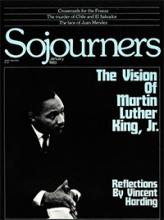On Good Friday, April 9, 1982, a group of Christians set out on a pilgrimage. They left from the Trident Nuclear Submarine Base at Bangor, Wash., to walk to Bethlehem, the birthplace of Jesus Christ. It is a journey one pilgrim calls "a walk from the place of death to the place of life."
The Bethlehem Peace Pilgrimage arrived in Washington, D.C., on Nov. 13, 1982. For seven months the pilgrims had journeyed across the United States. Praying as they walked, they followed the rail tracks that carry the Trident missile motors through Washington, Oregon, and Idaho, and then continued eastward. The pilgrimage will spend the winter on the East Coast before walking through Europe to Bethlehem. The 6,500-mile trip will be completed when the pilgrims reach Bethlehem during Christmas, 1983, after 32 months of witnessing for peace and nuclear disarmament.
Father Jack Morris, SJ, founded the pilgrimage and chose its destination: "I wanted to go to Bethlehem for reasons of faith ... I think the spirituality of the the pilgrimage is a forgotten thing which needs to be revived. It's a purifying thing." In a newsletter the pilgrims wrote, "Bethlehem is the breach where divine power breaks into human history to provide us with the way to peace."
When asked why one should make a pilgrimage the pilgrims replied, "To go to peace with the same fervor with which we've gone to war." Morris explained that in the past, "folks left family, wife, children, and jobs for war--and it was taken for granted. We need to go to peace--people need to be willing to leave jobs, families, sweethearts, and dedicate themselves to peace. These pilgrims have given up jobs, privacy, parents, homes to do this."
Read the Full Article

